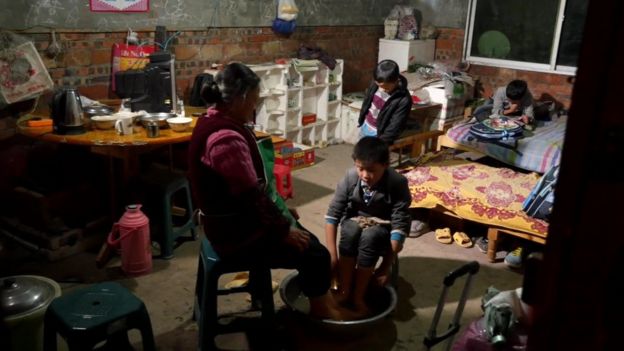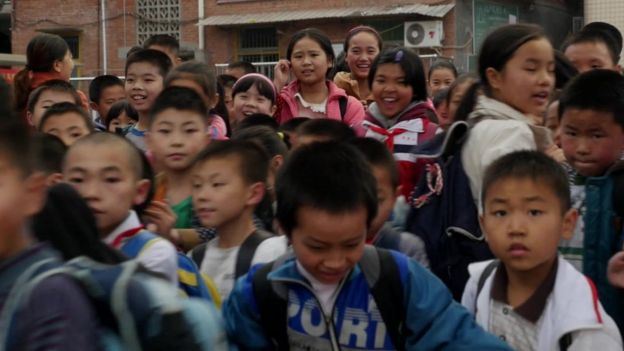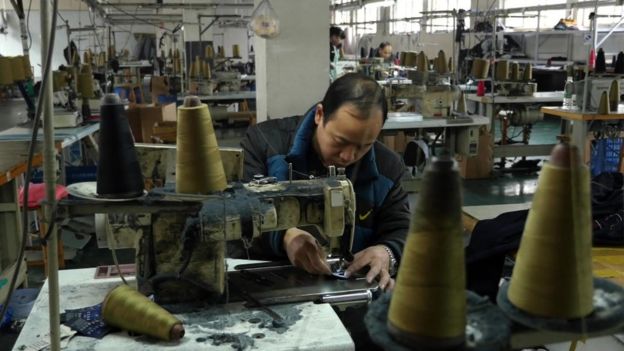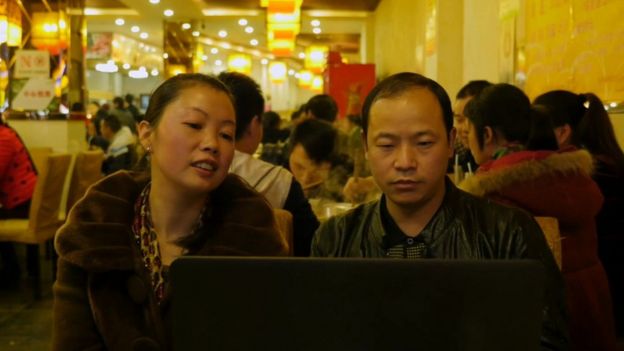10 million 'left-behind children' in China go a full year without seeing their parents
Media captionLeft behind child: 'When Mum and Dad come back to visit, I run to meet them... I run a very long way"
It has been an industrial revolution on steroids.
China has done in a few short decades what it took other countries the best part of a century to complete. And if the pace is extraordinary, then so too is the scale.
Britain had a population of around 10 million when its industrial revolution began - China's today, is more than a hundred times that size.
In the five years to 2013, China's construction industry poured as much cement and its banks lent as much money as the US did in the whole of the 20th Century.
So it should come as no surprise that the social dislocation accompanying this economic upheaval is of a degree that Charles Dickens couldn't have imagined in his wildest dreams.
And nothing highlights the human cost quite like the issue of China's left behind children.
One-fifth of all children in China
Tang Yuwen's story in the animation above is just one among many, many such stories.
His parents work in the textile mills in the city of Chengdu, dragged away from the village by the same forces that took their latter day British counterparts to Manchester a century ago.
The best current estimate suggests that more than 60 million children are growing up in the Chinese countryside while their parents live and work elsewhere, manning the assembly lines and operating the construction machinery at the heart of China's economic miracle.
That's one fifth of all the children in China and, in recent years, the country's state-run media appears to have been given license to discuss the tragic consequences.
In June 2015, four siblings - the youngest just five-years-old - whose parents had left home to work elsewhere killed themselves by consuming pesticide.
New report finds 61 million children in China are left behind, alone or with elderly relatives while parents search for work in nation's boomtowns

"Left-behind" children queue up for lunchtime at a school in Maguang County, Yunnan Province, China
By Charlotte Middlehurst, Shanghai 12:45PM BST 19 Jun 2015 http://www.telegraph.co.uk/news/worldnews/asia/china/11686079/10-million-left-behind-children-in-China-go-a-full-year-without-seeing-their-parents.html
Ten million children in rural China go a full year without seeing their parents as adults leave for the nation's boomtowns in search of work, a report into the country's "left behind" generation has found.
The ‘White Paper on Left Behind Children’, published on Thursday by the Beijing Children's Mental Health Care Centre, said children of economic migrants left alone or with elderly relatives can suffer serious psychological problems.
"We may not be able to help the children directly, but through the impact of the media, the community and by mobilising resources, we can bring about indirect change," said Li Yifei, professor of psychology at Beijing Normal University and report author, in The Beijing Times. "These children need mental nourishment just as much as material donations."
The problem is particularly prevalent in China's poorest regions. Families in China's north-west were identified by the report as being most at risk followed by the south-west. The economically prosperous eastern coastal region was least affected.
The reports followed the tragic deaths of four siblings, aged between 5-13 years old, in the south-western province of Guizhou last Tuesday, which sparked widespread sympathy and outrage across China.
The boy and three girls, who lived alone in a three-floor house, were found dead after allegedly killing themselves by drinking pesticide.
The father, identified as Zhang Fangqi, left in March to work in Guangdong, leaving the children unattended, although he wired money home periodically, state media site Xinhua reported.
The mother, Ren Xifen, left the family last year after she was allegedly beaten by Mr Zhang.
Xi Jinping, China's president, visited a village in the same province on Friday, where he told the residents of Huamao that poverty is "nothing to fear".
Mr Xi was quoted as saying: “A good life is created with one’s own hands, so poverty is nothing to fear. If we have determination and confidence, we can overcome any difficulty.”
The nationwide survey asked 2,000 families living across the breadth of the country, from China's south-eastern industrial belt to its poorest provinces in the north, focusing on the rural areas of Guizhou, Shandong, Hebei, Gansu, Yunnan and Guangxi province.
There are an estimated 61 million children left behind in China. The report said 15.1 per cent of this group go without parental contact for an entire year. Some 4.3 per cent do not even receive a phone call in that time.
The report pointed to the growing cases of acute distress and anxiety among children who are forced to fend for themselves and live without critical parental nurture.
If children fail to receive a bare minimum of physical contact once at least once a week, their odds of developing mental illness are significantly increased.
The report also cited gender differences, claiming that signs of distress and anxiety were more prevalent in girls than boys, as they tend to be "more sensitive, cautious and introvert", and less able to express their trauma.

"Left-behind" children queue up for lunchtime at a school in Maguang County, Yunnan Province, China
By Charlotte Middlehurst, Shanghai 12:45PM BST 19 Jun 2015 http://www.telegraph.co.uk/news/worldnews/asia/china/11686079/10-million-left-behind-children-in-China-go-a-full-year-without-seeing-their-parents.html
Ten million children in rural China go a full year without seeing their parents as adults leave for the nation's boomtowns in search of work, a report into the country's "left behind" generation has found.
The ‘White Paper on Left Behind Children’, published on Thursday by the Beijing Children's Mental Health Care Centre, said children of economic migrants left alone or with elderly relatives can suffer serious psychological problems.
"We may not be able to help the children directly, but through the impact of the media, the community and by mobilising resources, we can bring about indirect change," said Li Yifei, professor of psychology at Beijing Normal University and report author, in The Beijing Times. "These children need mental nourishment just as much as material donations."
The problem is particularly prevalent in China's poorest regions. Families in China's north-west were identified by the report as being most at risk followed by the south-west. The economically prosperous eastern coastal region was least affected.
The reports followed the tragic deaths of four siblings, aged between 5-13 years old, in the south-western province of Guizhou last Tuesday, which sparked widespread sympathy and outrage across China.
The boy and three girls, who lived alone in a three-floor house, were found dead after allegedly killing themselves by drinking pesticide.
The father, identified as Zhang Fangqi, left in March to work in Guangdong, leaving the children unattended, although he wired money home periodically, state media site Xinhua reported.
The mother, Ren Xifen, left the family last year after she was allegedly beaten by Mr Zhang.
Xi Jinping, China's president, visited a village in the same province on Friday, where he told the residents of Huamao that poverty is "nothing to fear".
Mr Xi was quoted as saying: “A good life is created with one’s own hands, so poverty is nothing to fear. If we have determination and confidence, we can overcome any difficulty.”
The nationwide survey asked 2,000 families living across the breadth of the country, from China's south-eastern industrial belt to its poorest provinces in the north, focusing on the rural areas of Guizhou, Shandong, Hebei, Gansu, Yunnan and Guangxi province.
There are an estimated 61 million children left behind in China. The report said 15.1 per cent of this group go without parental contact for an entire year. Some 4.3 per cent do not even receive a phone call in that time.
The report pointed to the growing cases of acute distress and anxiety among children who are forced to fend for themselves and live without critical parental nurture.
If children fail to receive a bare minimum of physical contact once at least once a week, their odds of developing mental illness are significantly increased.
The report also cited gender differences, claiming that signs of distress and anxiety were more prevalent in girls than boys, as they tend to be "more sensitive, cautious and introvert", and less able to express their trauma.
Counting the cost of China’s left-behind children
- 12 April 2016
- China
It has been an industrial revolution on steroids.
China has done in a few short decades what it took other countries the best part of a century to complete. And if the pace is extraordinary, then so too is the scale.
Britain had a population of around 10 million when its industrial revolution began - China's today, is more than a hundred times that size.
In the five years to 2013, China's construction industry poured as much cement and its banks lent as much money as the US did in the whole of the 20th Century.
So it should come as no surprise that the social dislocation accompanying this economic upheaval is of a degree that Charles Dickens couldn't have imagined in his wildest dreams.
And nothing highlights the human cost quite like the issue of China's left behind children.
One-fifth of all children in China
Tang Yuwen's story in the animation above is just one among many, many such stories.
His parents work in the textile mills in the city of Chengdu, dragged away from the village by the same forces that took their latter day British counterparts to Manchester a century ago.

The best current estimate suggests that more than 60 million children are growing up in the Chinese countryside while their parents live and work elsewhere, manning the assembly lines and operating the construction machinery at the heart of China's economic miracle.
That's one fifth of all the children in China and, in recent years, the country's state-run media appears to have been given license to discuss the tragic consequences.
In June 2015, four siblings - the youngest just five-years-old - whose parents had left home to work elsewhere killed themselves by consuming pesticide.
The China Daily report makes clear it is not an isolated case.
'I miss them so much'
Tang Yuwen lives in the county of Sixian in Sichuan province with his grandmother, his younger brother and his two cousins.
During the week, they spend the time in a one-room apartment a short walk from school.
They're poor. They bathe in a metal tub placed on the floor in the centre of the room and they share a toilet with their neighbours.
All four boys are "left behind children" and over the decades, as millions of workers have streamed out of remote, rural Sichuan, theirs is a common experience.
In Sixian's primary school up to 80% of the pupils are live without their mums or dads.
Modern day China may have been built on the hard graft of its internal migrant labourers, but it has taken a heavy toll from their children too.
The bereavement is all too plain to hear in Tang Yuwen's interview.
"I know it is hard for mum and dad to earn money," he tells me, "but I miss them so much, it is very painful."
Read more on the transformation of China
Special report: White Horse Village
Designed in China: The Facts
BBC's China editor Carrie Gracie: The village and the girl
In Guizhou province, not far from where the 2015 pesticide poisoning took place, we find 14-year-old Tao Lan, living with her 11-year-old brother, Tao Jinkun.
They are among perhaps China's most shocking child welfare statistic: more than two million left behind children are thought to be living alone, without the support of a close relative.
In a two-room home, with the wind blowing through the gaps in the wooden boards, Tao Lan helps her younger brother with his homework, she grows their own vegetables on a small patch outside and she cooks their meals.
The two take it in turns to wash the dishes.
Their parents live and work more than a thousand miles away, and come back just once a year.
"If you've had a bad day at school it must be very hard not to be able to talk to your mum and dad about it," I suggest to Tao Lan.
"I can't tell them," she replies, and then, wiping tears from her eyes: "Mum and Dad live a hard life, I don't want them to worry about me."
There is, of course, a now accepted view in the West that deprivation and childhood neglect can increase the likelihood of anti-social and criminal behaviour later in life.
But what strikes me when talking to the children we meet in Sichuan and Guizhou is not anger or resentment.
It is instead their readiness to accept with extraordinary maturity that their parents have had to make difficult choices out of economic necessity.
Even so they can't always hide the emotional cost, a tension most visible perhaps in our interview with nine-year-old Zhan Jiayue, a school-mate of Tang Yuwen's.
Spurred on no doubt by the mounting public concern, the government has decided that it needs to be seen to be acting.
It recently issued a new directive, reiterating existing laws against child abandonment and reminding local authorities of their duty to protect vulnerable children.
And now the authorities have announced that they will conduct a nationwide census, the first of its kind, in an attempt to gain a proper account of the number of left behind children.
But the truth is the efforts to enhance enforcement and to gather better data will not do much to address the root causes of the problem.
'I worry about his safety'
The textile factories in the city of Chengdu are just a few hours drive from Tang Yuwen's home village.
But the long hours and the need to save money mean his parents are able to travel home only two or three times a year at best. And yet the obvious solution, taking their children, with them is not an option.
Despite years on the production lines it is almost impossible for them to lose their official migrant status.
China's household registration system means that although they can work wherever they choose, they and their children can only exercise their welfare rights, including access to health care and education, in their home village.
It is a strict system that has allowed China to manage its population flows and, arguably, prevent a common scourge of other industrial revolutions elsewhere; slum developments as whole families flood into the cities in search of a better life.
In a restaurant close to their factories, we show Tang Yuwen's parents the interview we recorded with their son.
It feels an uncomfortable and somewhat cruel device, the kind beloved of TV news reporters in search of dramatic effect, but both parents are keen to see the video.
After all, they haven't seen Tang Yuwen for five months.
Tang Yujun laughs when he sees his 12-year-old boy dressed in formal attire, something I'd taken to be a small, personal flourish of eccentricity amid the drabness of village life. It turns out he's been rifling through Dad's wardrobe.
"That's my tie!" Mr Tang exclaims.
But again, the emotion is just below the surface and we soon glimpse the pain of the enforced separation, this time from the parents perspective, a pain multiplied tens of millions of times across this vast country.
"I'm so worried, because I'm not with him," his mother Liu Ting tells me through her tears. "I worry about his safety. If there were no legal barriers, we would bring him with us."
There is talk about reforming the household registration system, but it will be slow and selective and it is likely to keep the megacities of Beijing, Shanghai and even Chengdu where Tang Yuwen's parent work, out of the reach of many rural families.
The government admits the problem of left behind children is urgent. But for everyone who buys a made-in-China product, or who invests in this still-growing economy, there is a question worth asking.
If this super-sized industrial revolution had taken place within more democratic constraints, might the migrant workers at the centre of it all have been able to demand something fundamental, and so often taken for granted elsewhere?
And might they by now have won that right to a family life?
http://www.bbc.com/news/world-asia-china-35994481
'I miss them so much'
Tang Yuwen lives in the county of Sixian in Sichuan province with his grandmother, his younger brother and his two cousins.
During the week, they spend the time in a one-room apartment a short walk from school.
They're poor. They bathe in a metal tub placed on the floor in the centre of the room and they share a toilet with their neighbours.
All four boys are "left behind children" and over the decades, as millions of workers have streamed out of remote, rural Sichuan, theirs is a common experience.

In Sixian's primary school up to 80% of the pupils are live without their mums or dads.
Modern day China may have been built on the hard graft of its internal migrant labourers, but it has taken a heavy toll from their children too.
The bereavement is all too plain to hear in Tang Yuwen's interview.
"I know it is hard for mum and dad to earn money," he tells me, "but I miss them so much, it is very painful."
Read more on the transformation of China
Special report: White Horse Village
Designed in China: The Facts
BBC's China editor Carrie Gracie: The village and the girl
In Guizhou province, not far from where the 2015 pesticide poisoning took place, we find 14-year-old Tao Lan, living with her 11-year-old brother, Tao Jinkun.
They are among perhaps China's most shocking child welfare statistic: more than two million left behind children are thought to be living alone, without the support of a close relative.
In a two-room home, with the wind blowing through the gaps in the wooden boards, Tao Lan helps her younger brother with his homework, she grows their own vegetables on a small patch outside and she cooks their meals.
The two take it in turns to wash the dishes.
Their parents live and work more than a thousand miles away, and come back just once a year.
"If you've had a bad day at school it must be very hard not to be able to talk to your mum and dad about it," I suggest to Tao Lan.
"I can't tell them," she replies, and then, wiping tears from her eyes: "Mum and Dad live a hard life, I don't want them to worry about me."
There is, of course, a now accepted view in the West that deprivation and childhood neglect can increase the likelihood of anti-social and criminal behaviour later in life.
But what strikes me when talking to the children we meet in Sichuan and Guizhou is not anger or resentment.
It is instead their readiness to accept with extraordinary maturity that their parents have had to make difficult choices out of economic necessity.
Even so they can't always hide the emotional cost, a tension most visible perhaps in our interview with nine-year-old Zhan Jiayue, a school-mate of Tang Yuwen's.
Spurred on no doubt by the mounting public concern, the government has decided that it needs to be seen to be acting.
It recently issued a new directive, reiterating existing laws against child abandonment and reminding local authorities of their duty to protect vulnerable children.
And now the authorities have announced that they will conduct a nationwide census, the first of its kind, in an attempt to gain a proper account of the number of left behind children.
But the truth is the efforts to enhance enforcement and to gather better data will not do much to address the root causes of the problem.
'I worry about his safety'
The textile factories in the city of Chengdu are just a few hours drive from Tang Yuwen's home village.
But the long hours and the need to save money mean his parents are able to travel home only two or three times a year at best. And yet the obvious solution, taking their children, with them is not an option.

Despite years on the production lines it is almost impossible for them to lose their official migrant status.
China's household registration system means that although they can work wherever they choose, they and their children can only exercise their welfare rights, including access to health care and education, in their home village.
It is a strict system that has allowed China to manage its population flows and, arguably, prevent a common scourge of other industrial revolutions elsewhere; slum developments as whole families flood into the cities in search of a better life.
In a restaurant close to their factories, we show Tang Yuwen's parents the interview we recorded with their son.
It feels an uncomfortable and somewhat cruel device, the kind beloved of TV news reporters in search of dramatic effect, but both parents are keen to see the video.
After all, they haven't seen Tang Yuwen for five months.
Tang Yujun laughs when he sees his 12-year-old boy dressed in formal attire, something I'd taken to be a small, personal flourish of eccentricity amid the drabness of village life. It turns out he's been rifling through Dad's wardrobe.
"That's my tie!" Mr Tang exclaims.

But again, the emotion is just below the surface and we soon glimpse the pain of the enforced separation, this time from the parents perspective, a pain multiplied tens of millions of times across this vast country.
"I'm so worried, because I'm not with him," his mother Liu Ting tells me through her tears. "I worry about his safety. If there were no legal barriers, we would bring him with us."
There is talk about reforming the household registration system, but it will be slow and selective and it is likely to keep the megacities of Beijing, Shanghai and even Chengdu where Tang Yuwen's parent work, out of the reach of many rural families.
The government admits the problem of left behind children is urgent. But for everyone who buys a made-in-China product, or who invests in this still-growing economy, there is a question worth asking.
If this super-sized industrial revolution had taken place within more democratic constraints, might the migrant workers at the centre of it all have been able to demand something fundamental, and so often taken for granted elsewhere?
And might they by now have won that right to a family life?
http://www.bbc.com/news/world-asia-china-35994481
No comments:
Post a Comment